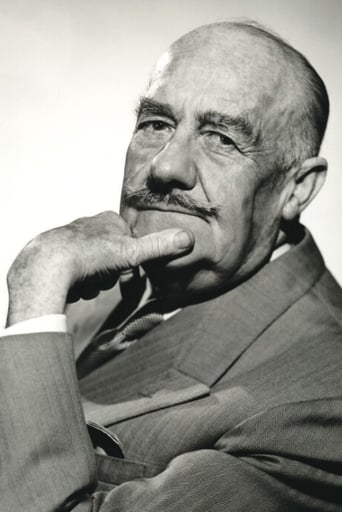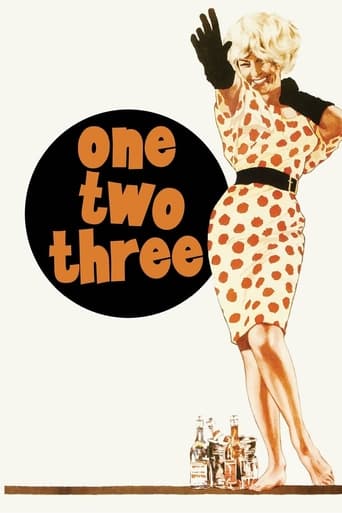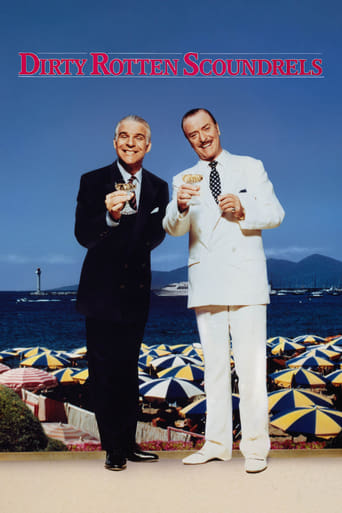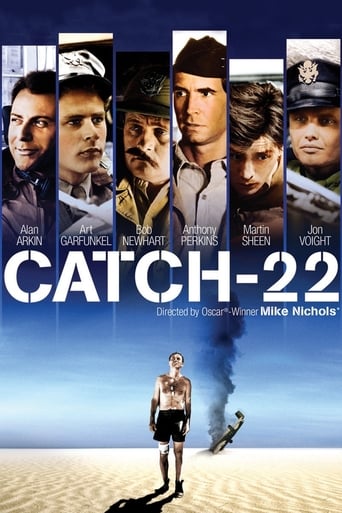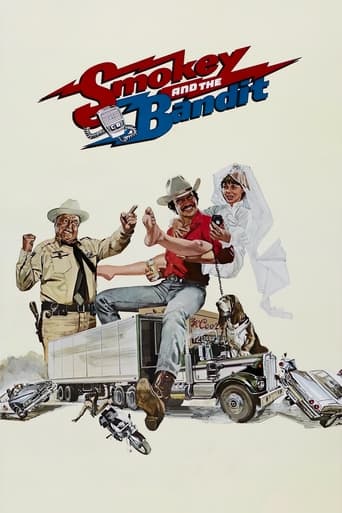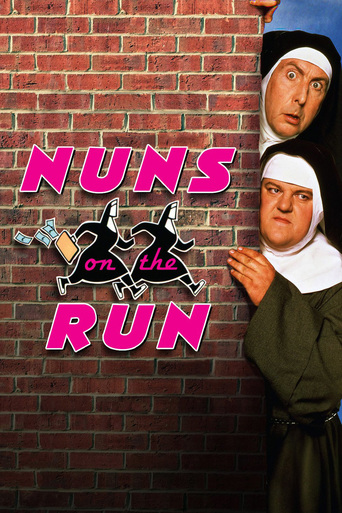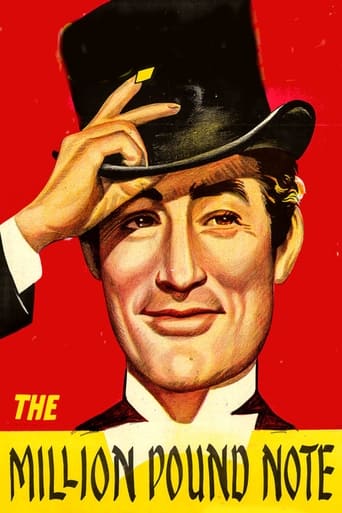
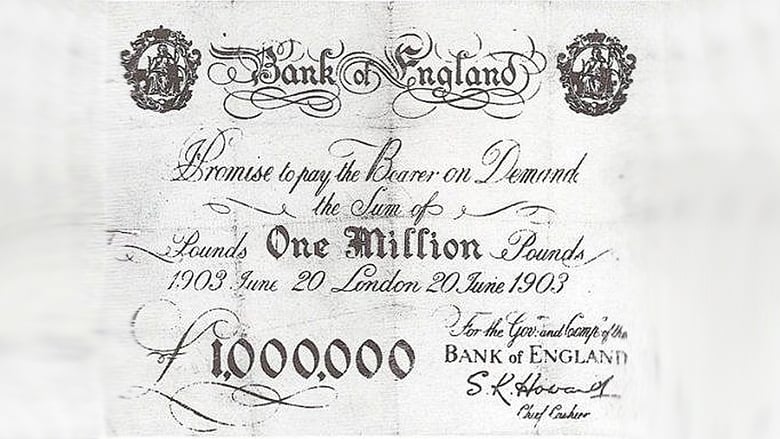
The Million Pound Note (1954)
An impoverished American sailor is fortunate enough to be passing the house of two rich gentlemen who have conceived the crazy idea of distributing a note worth one million pounds. The sailor finds that whenever he tries to use the note to buy something, people treat him like a king and let him have whatever he likes for free. Ultimately, the money proves to be more troublesome than it is worth when it almost costs him his dignity and the woman he loves.
Watch Trailer
Cast


Similar titles
Reviews
Imagine a cross between Brewster's Millions and Trading Places, and you'll get Gregory Peck's Man with a Million. Wilfrid Hyde-White and Ronald Squire, are rich and idle brothers looking for a little fun. They come up with a bet: give a total stranger a million pound note, and tell him that if he lasts a month without spending it, they'll give him a good job. One man thinks it's the knowledge of having untouchable wealth that will propel the pauper into the high life, and the other thinks he'll have to spend it to get ahead. Greg plays the Man with a Million, or in other countries' release, the man with The Million Pound Note.If you like those types of movies, you'll like this one, since it doesn't stray very far from the usual mold. There's a moral debate, lots of jokes, lots of satire about the upper class—it stems from a Mark Twain story—and a fair amount of silliness. Plus, it's a period piece and Greg looks very handsome in his beautiful clothes, so you'll have plenty of eye candy. If you're looking for a more serious Gregory Peck movie, you've got tons to choose from, but it's nice to see him step out from his Atticus Finch person and have some silly fun every once in a while.
Excellent stuff.I'd like to mention first of all that for a 50's film, this was surprisingly laugh out loud funny. Did not expect to be laughing this wholeheartedly at such a production, mainstream humor at the time being pretty thick most of the time.Well, what can be said about this. The story and main idea and narrative from Mark Twain is excellent, full of moral on various levels and in a multitude of aspects, and it's carefully carried out and very well executed here.Cary Grant does very well as the modest American with lots of guts but firstly naturally humble and progressively more and more decisive.This film is all of funny, fun...interesting on a philosophical level as well as in its purely cinematic dimension; that is well structured, with a certain tension always held at just the right dose, and the release well timed at the end. Every scene with a point, pleasant and important to the whole.8/10
Oliver and Roderick Montpellier, two English brothers, make a bet that any man given a one million pound note, can live off the fat of the land just by showing off the good fortune of having it in his possession. Then, if by the end of a month, if he can show the intact bill, he will indeed be a man worthy of whatever fortunes might befall on him because of the sheer luck of proving the brothers right.The lucky recipient of the note is one Henry Adams, an American in London who is just a poor man with no money, or prospects of a job in the near future. He tests his good fortune when he decides to dine at a modest restaurant. As the bill comes, he shows his one million pound note, which of course, the owner can't possibly change. The meal is free.Henry Adams then discovers how he can go through his present situation relying on the fact that he is a millionaire, without really being one. He is given a set of smart clothes, a suite at one of the best hotels in town, and an introduction to high society, something that is not always available to Americans, even rich ones, as Henry appears to be.This delightful comedy of 1954 was a total surprise. The film, made in England at the famous Pinewood studios, was directed by Ronald Neame. Based on a Mark Twain story, which we haven't read, it counts on the great work of Gregory Peck, a man that was one of the most charismatic performers during his years in the cinema. Mr. Peck is the whole movie; it's unimaginable to think of any other actor playing Henry Adams.The supporting cast shows familiar faces of consummate English players who contribute to create the Edwardian atmosphere. Ronald Squire and Wilfrid Hyde-White are the Montpellier brothers, whose bet trigger the action. Reginald Beckwith is the mute valet who sticks by Henry through thick and thin. Jane Griffiths plays Portia, the woman that conquers Henry Adams heart. Also in the cast we saw Hugh Griffith, in a non-credited role. Joyce Grenfell, another delightful character actress, has some brilliant moments as the Duchess of Cromarty.An enjoyable movie. Catch if it ever plays on your classic movie channel. You won't be disappointed!
Arriving home, with a long day of work behind me, and another ahead, I was in the mood for something friendly and undemanding. Ronald Neame's 'The Million Pound Note (1953)' was exactly what the doctor ordered. This lightweight British comedy is, for one, wholly and absolutely pleasant: notice how there is not a single villain in the entire film, every character likable in their own, distinctively-British way. The old family friend, whom we are certain is a grumbling and untrustworthy shyster, turns out to be an honest entrepreneur. The man who arranges to deprive Henry Adams (Gregory Peck) of his wealth is merely a doddering old eccentric who just wants to show some patriotism for a personal lark. This is the sort of film whose conclusion is never in any doubt: Peck will get the girl, achieve happiness, and learn to live without the extravagance to which he thought he would become accustomed. Frankly, I can't imagine the film ending any other way.When penniless American stowaway Henry Adams (Peck, probably on his way to Italy to film 'Roman Holiday (1953)') requests a small loan from the US embassy in London, he is flatly denied by an indifferent official. However, a pair of childish millionaires (Ronald Squire and Wilfrid Hyde-White) have an even greater plan for him. They loan Henry a rare million pound note, which he is forbidden to cash in, for just a one month engagement. Pretty soon, every store and hotel owner in the city is tripping over themselves to offer him free services, irrationally smitten with the honour of serving a wealthy American, however unorthodox his dress manner may be. Of course, the arrival of "millionaire" Henry Adams doesn't go unnoticed in the high societies of London, and Portia Landsdowne (Jane Griffiths) is soon love-struck with the humble American, though his apparent wealth hinders rather than aids their love affair. Will the couple be together by the film's end? You don't need me to tell you.Though I had expected 'The Million Pound Note' to be a slightly wooden comedy, it was great to find the film regularly inciting a hearty chuckle. Two moments stand out above all the others. Firstly, Gregory Peck opening the brothers' envelope for the first time to pay for a hearty meal, and dazedly apologising for not having anything smaller (the store-owners accept Henry as an "eccentric millionaire" and offer the meal for free). Secondly, the charity auction event in which the famous American millionaire carefully counts the coins in his hand to bid £82 12s, before inadvertently bidding £5000 for a rather commonplace vase. As lightweight as it may be, the film also aims a few modest jabs at the superficiality and hypocrisy of British society, most of the characters welcoming Henry Adams only when under the impression that he is absurdly wealthy; there's a harsh but all-too-true irony in the fact that Henry can only secure a cash loan once the American embassy believes that he doesn't need it.



